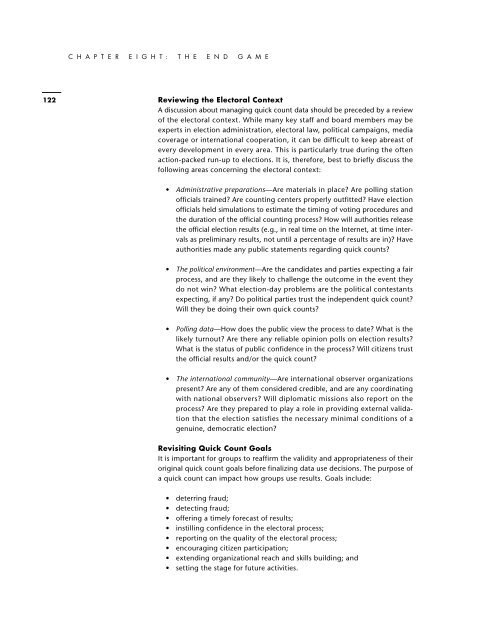The Quick Count and Election Observation
The Quick Count and Election Observation
The Quick Count and Election Observation
You also want an ePaper? Increase the reach of your titles
YUMPU automatically turns print PDFs into web optimized ePapers that Google loves.
C H A P T E R E I G H T : T H E E N D G A M E<br />
122 Reviewing the Electoral Context<br />
A discussion about managing quick count data should be preceded by a review<br />
of the electoral context. While many key staff <strong>and</strong> board members may be<br />
experts in election administration, electoral law, political campaigns, media<br />
coverage or international cooperation, it can be difficult to keep abreast of<br />
every development in every area. This is particularly true during the often<br />
action-packed run-up to elections. It is, therefore, best to briefly discuss the<br />
following areas concerning the electoral context:<br />
• Administrative preparations—Are materials in place? Are polling station<br />
officials trained? Are counting centers properly outfitted? Have election<br />
officials held simulations to estimate the timing of voting procedures <strong>and</strong><br />
the duration of the official counting process? How will authorities release<br />
the official election results (e.g., in real time on the Internet, at time intervals<br />
as preliminary results, not until a percentage of results are in)? Have<br />
authorities made any public statements regarding quick counts?<br />
• <strong>The</strong> political environment—Are the c<strong>and</strong>idates <strong>and</strong> parties expecting a fair<br />
process, <strong>and</strong> are they likely to challenge the outcome in the event they<br />
do not win? What election-day problems are the political contestants<br />
expecting, if any? Do political parties trust the independent quick count?<br />
Will they be doing their own quick counts?<br />
• Polling data—How does the public view the process to date? What is the<br />
likely turnout? Are there any reliable opinion polls on election results?<br />
What is the status of public confidence in the process? Will citizens trust<br />
the official results <strong>and</strong>/or the quick count?<br />
• <strong>The</strong> international community—Are international observer organizations<br />
present? Are any of them considered credible, <strong>and</strong> are any coordinating<br />
with national observers? Will diplomatic missions also report on the<br />
process? Are they prepared to play a role in providing external validation<br />
that the election satisfies the necessary minimal conditions of a<br />
genuine, democratic election?<br />
Revisiting <strong>Quick</strong> <strong>Count</strong> Goals<br />
It is important for groups to reaffirm the validity <strong>and</strong> appropriateness of their<br />
original quick count goals before finalizing data use decisions. <strong>The</strong> purpose of<br />
a quick count can impact how groups use results. Goals include:<br />
• deterring fraud;<br />
• detecting fraud;<br />
• offering a timely forecast of results;<br />
• instilling confidence in the electoral process;<br />
• reporting on the quality of the electoral process;<br />
• encouraging citizen participation;<br />
• extending organizational reach <strong>and</strong> skills building; <strong>and</strong><br />
• setting the stage for future activities.


